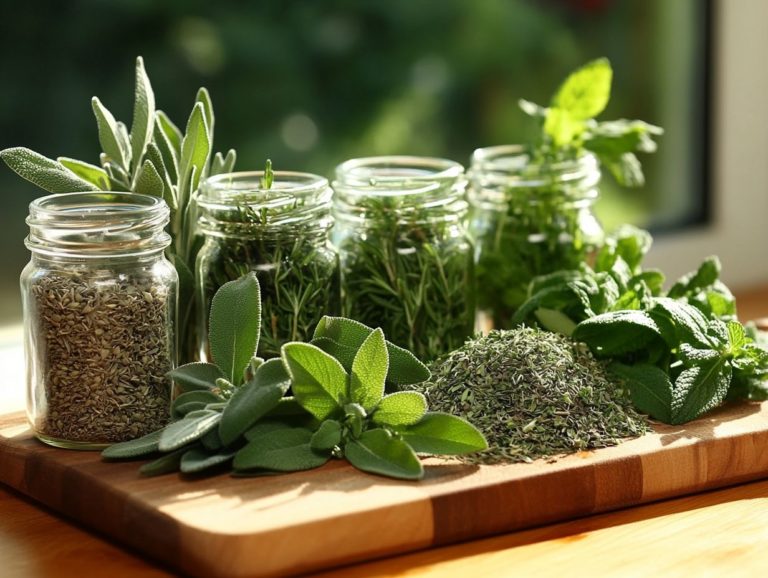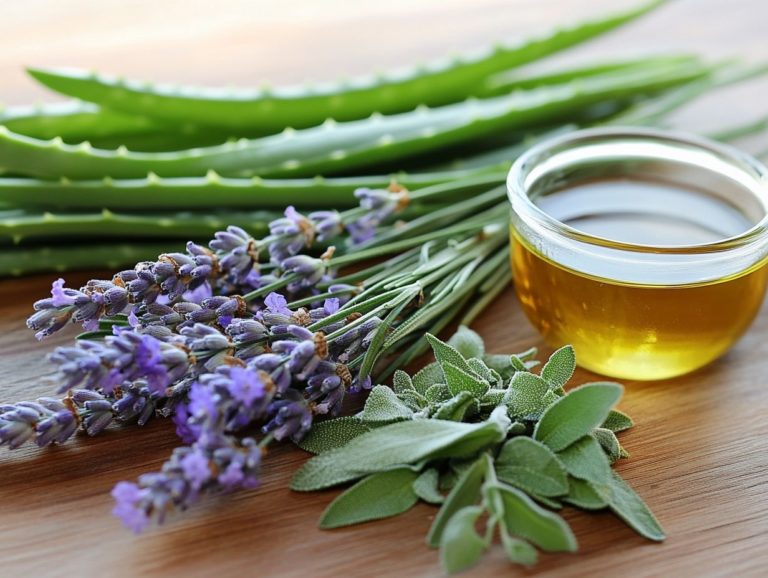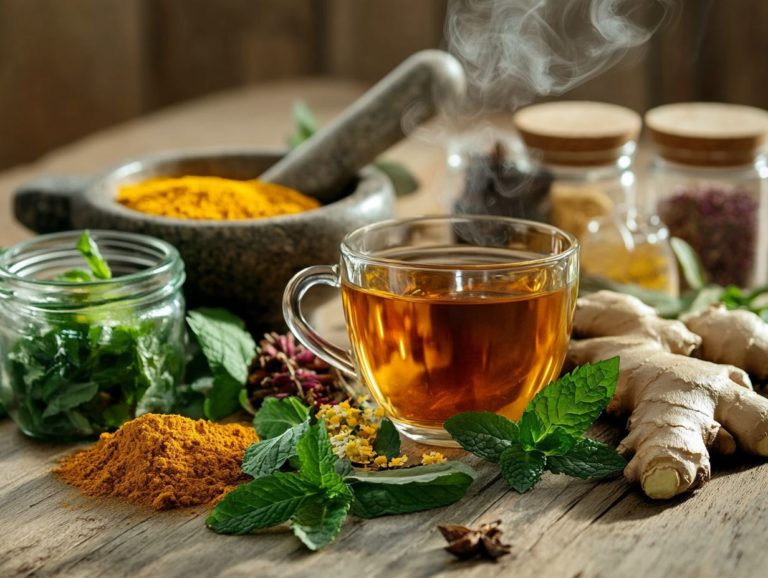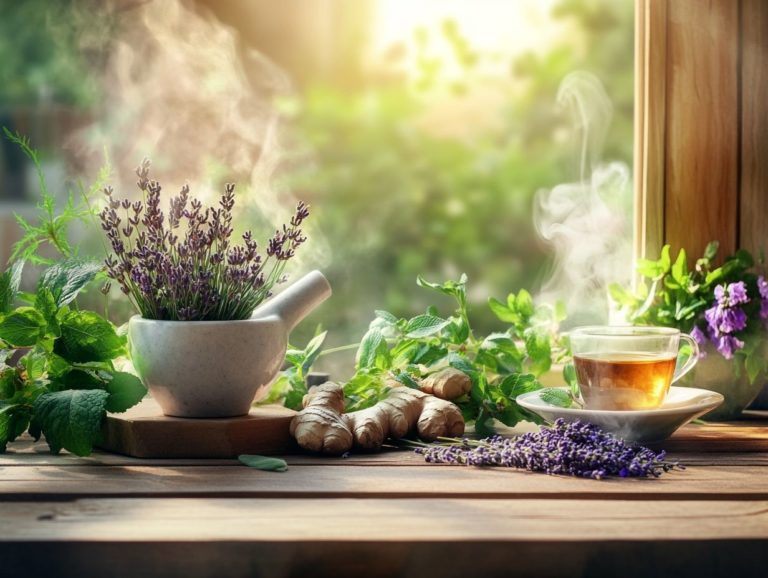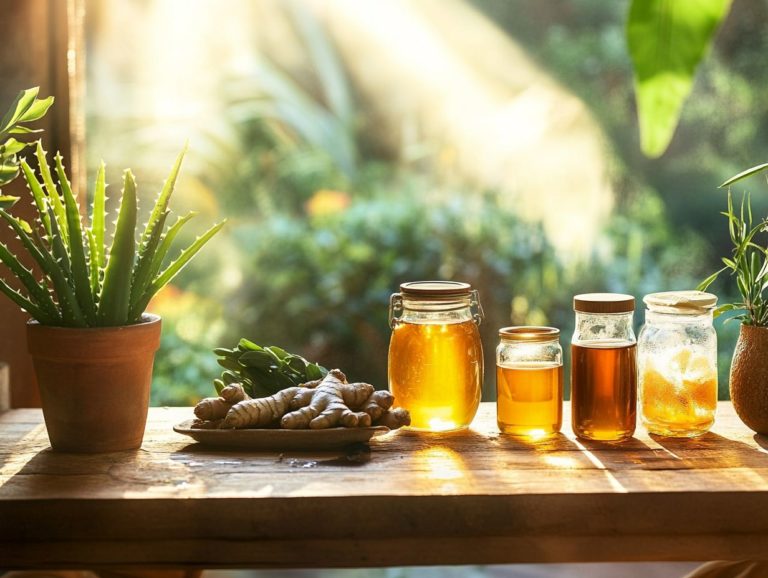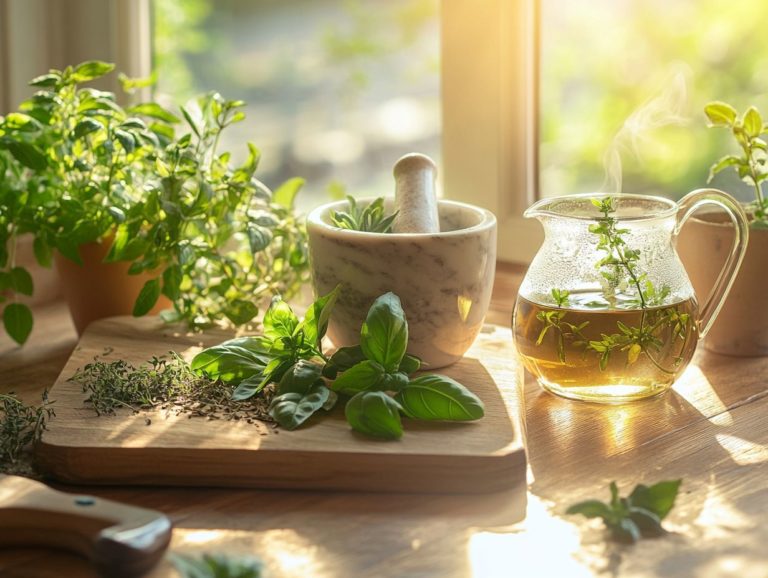How Herbs Can Help with Seasonal Flu
Seasonal flu can be quite the annoying foe, causing discomfort and throwing your daily routine into disarray. While conventional treatments may provide some relief, more and more people are discovering the amazing benefits of natural remedies.
This article delves into the realm of herbs that have been cherished for their ability to alleviate flu symptoms. You’ll explore the powerful properties of echinacea and elderberry, as well as the remarkable benefits of garlic and ginger. Discover how these natural remedies can assist you in both prevention and treatment.
We’ll also discuss dosages, potential side effects, and important moments to exercise caution, equipping you with the knowledge to make informed choices about your health.
Contents
- Key Takeaways:
- Understanding Seasonal Flu
- Common Herbs Used for Flu and Cold Treatment
- How These Herbs Help with Flu Symptoms
- Using Herbs for Prevention and Treatment
- Possible Side Effects and Interactions
- Frequently Asked Questions
- What are some herbs that can help with seasonal flu?
- How does echinacea help with seasonal flu?
- Can elderberry really help with seasonal flu?
- What is the best way to use ginger for seasonal flu?
- Are there any potential side effects of using herbs for seasonal flu?
- Is it safe to use herbs with flu medication?
Key Takeaways:
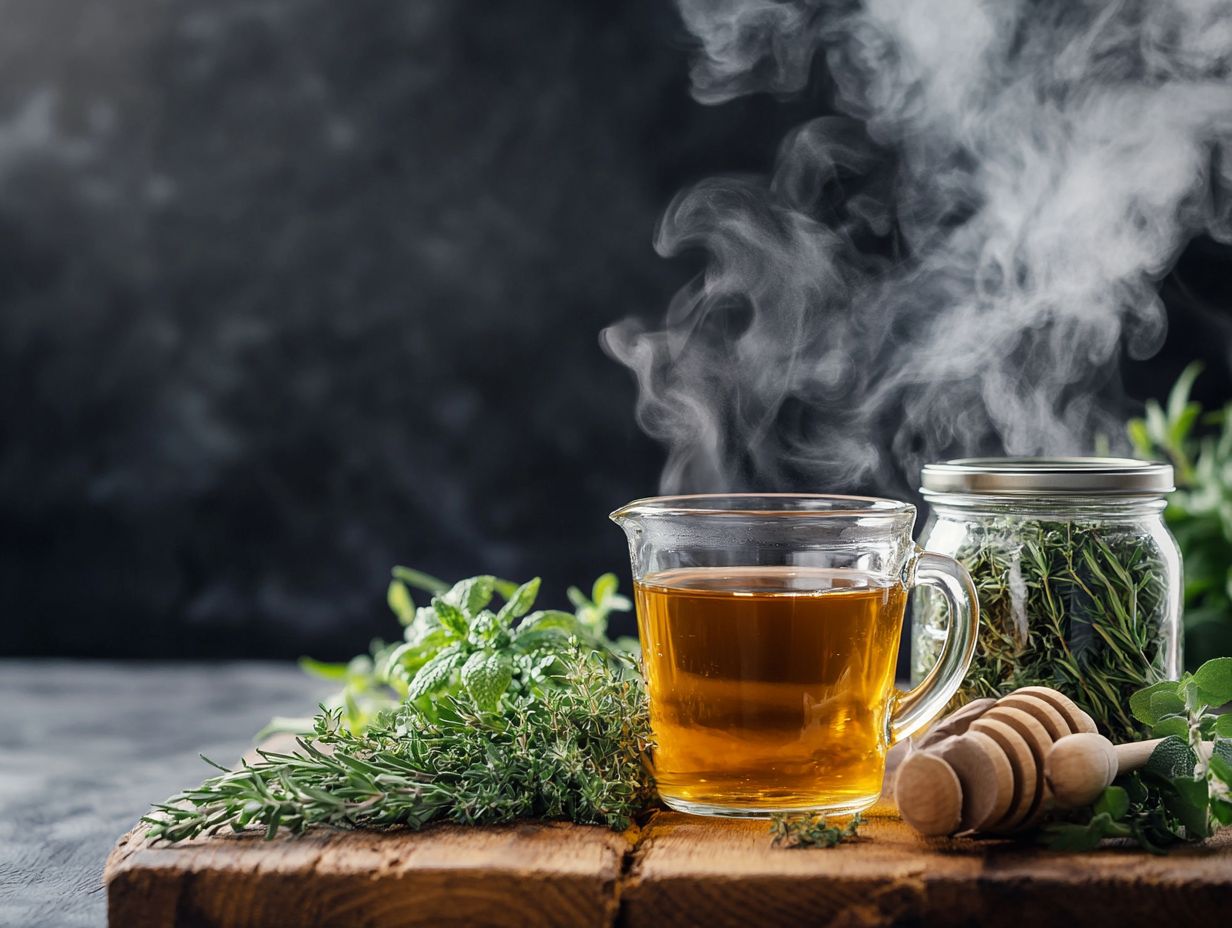
- Herbs such as echinacea, elderberry, garlic, ginger, and andrographis have anti-inflammatory and antiviral properties that can help alleviate seasonal flu symptoms and support your immune system.
- Using recommended dosages and methods, these herbs can be used for both prevention and treatment of the flu.
- While generally safe to use, it’s important to be aware of possible side effects and interactions with other medications when using herbs for flu relief.
Understanding Seasonal Flu
Grasping the nuances of seasonal flu and the common cold is essential for nurturing a robust immune system, particularly during peak seasons when the virus becomes rampant. Seasonal flu, driven by influenza viruses, presents a range of symptoms that can significantly disrupt respiratory health, resulting in discomfort and possible complications.
This viral infection is not only highly contagious but also varies in its impact depending on factors like age, health history, and individual immune response. Recognizing flu and cold symptoms is vital, as it helps you get treatment quickly and make effective use of natural remedies, including specific herbs tailored to your needs.
What is Seasonal Flu?
Seasonal flu refers to the viral infection caused by influenza viruses that make their annual rounds, bringing with them a host of symptoms that target the respiratory system.
This illness primarily stems from three key types of influenza viruses: A, B, and C. Influenza A and B are the heavy hitters behind the most widespread outbreaks, while type C tends to be the less aggressive cousin, usually resulting in milder symptoms. It s important to recognize that these viruses spread easily through respiratory droplets when an infected person coughs or sneezes, placing those with weakened immune systems at a heightened risk.
Common symptoms of the seasonal flu and common cold include:
- Fever
- Coughing
- Sore throat
- Muscle aches
- Fatigue
These symptoms can often lead to complications, particularly in vulnerable populations such as the elderly and individuals with pre-existing health conditions.
Common Herbs Used for Flu and Cold Treatment
Numerous herbs have garnered acclaim for their potential therapeutic benefits in treating the flu. Notable options such as echinacea, elderberry, garlic, and ginger stand out, as they not only bolster your immune system but also aid in effectively alleviating flu symptoms.
Echinacea
Echinacea is celebrated for its remarkable immune-boosting properties, earning its place as a favored herb in natural remedies for flu treatment. This powerful herb employs its unique compounds to enhance your immune response, giving your body the power to more effectively combat flu viruses.
By encouraging the production of white blood cells and helping to reduce inflammation, echinacea stands as a formidable ally during flu season. Available in a variety of forms teas, tinctures, and capsules it caters to different preferences and lifestyles, ensuring you find the perfect fit.
When paired with other potent herbs like elderberry and ginger, echinacea, along with yarrow and basil, can create a robust defense system against viral infections, promoting a holistic approach to your overall wellness and health.
For optimal flu prevention and treatment, consider exploring these herbal remedies and consult a healthcare professional if you experience flu symptoms.
Elderberry
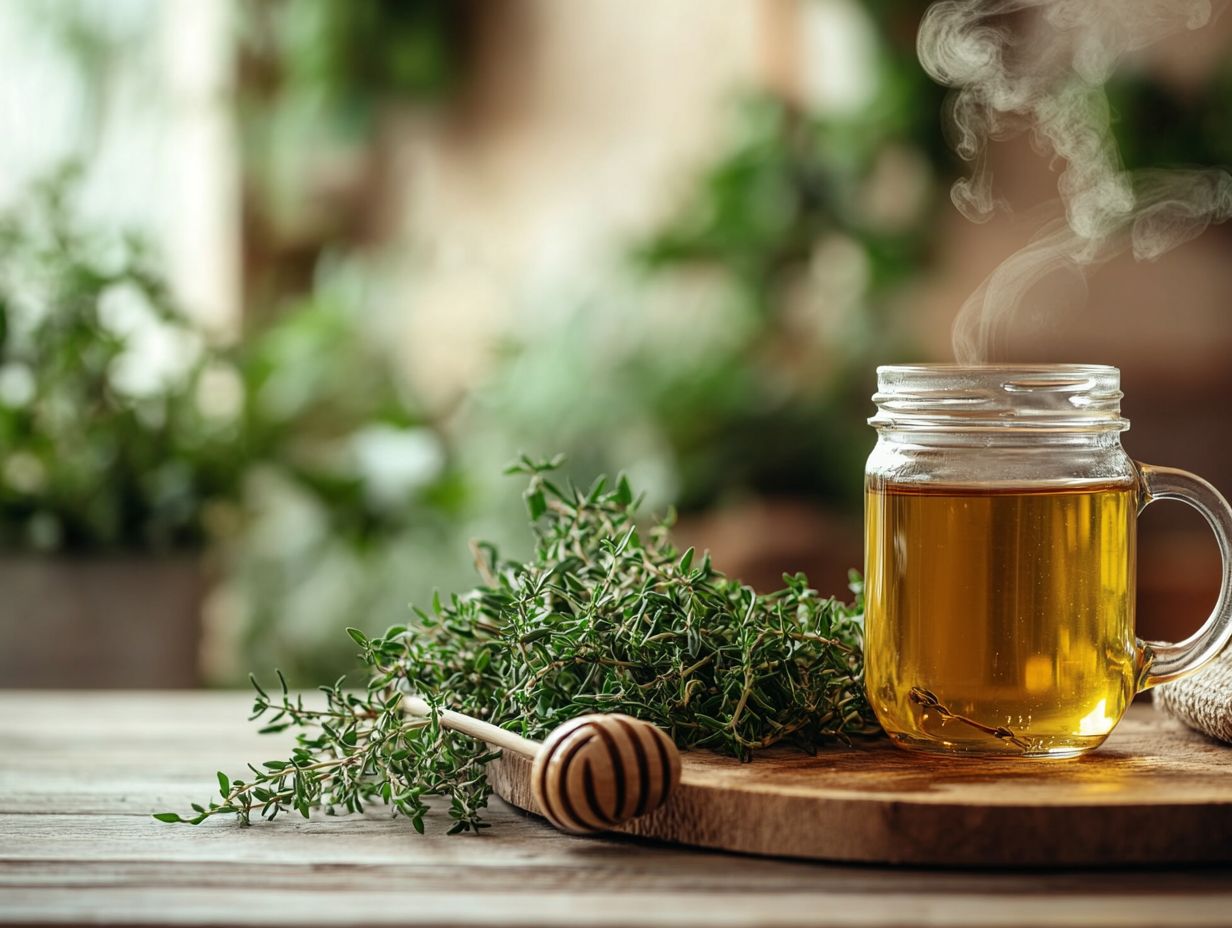
Elderberry is widely celebrated for its antiviral properties. It serves as a compelling natural remedy for flu treatment.
This remarkable herb has gained attention for its ability to soothe and alleviate flu symptoms. It also plays a role in enhancing your body’s immune response.
When paired with other potent herbs like echinacea and garlic, elderberry can form a formidable defense against the flu. This is due to the synergistic effects of their active compounds.
If you want to boost your health during flu season, try adding elderberry to your routine. You can use it in syrups or soothing teas for relief and support.
This natural remedy emerges as a valuable ally in your pursuit of better health and wellness during challenging times.
Garlic
Garlic does more than add flavor; it packs a punch as a powerful herb renowned for its immune-boosting and natural antibiotic properties. It is particularly beneficial in treating flu and colds.
Its unique composition features compounds like allicin, which provides remarkable support for fortifying your body’s defenses against viruses and infections.
Many wellness enthusiasts appreciate garlic for its capacity to enhance overall respiratory health. It is an effective remedy during flu season.
Incorporating garlic into your daily meals or opting for it as a supplement is an effective strategy for maintaining your immune resilience.
You can also find garlic in natural remedies like teas or tinctures, making it easy to enjoy its healing qualities.
Ginger
Ginger is a remarkable herb known for its powerful anti-inflammatory properties. It often serves as a natural remedy to alleviate flu symptoms and soothe your respiratory system.
This warming root is packed with bioactive compounds like gingerol and shogaol. These are vital for reducing throat irritation and helping to break up unwanted mucus.
When you brew a cup of ginger tea, you not only indulge in its comforting warmth but also benefit from essential antioxidants that can strengthen your immune system.
If you’re dealing with congestion, ginger acts as a natural decongestant, promoting clearer airways and making breathing easier.
By incorporating ginger into your diet during flu season, you can significantly ease the discomfort associated with respiratory ailments.
Andrographis
Andrographis is an herb renowned for its remarkable ability to bolster the immune system. It acts as a natural remedy for flu treatment.
This extraordinary plant is packed with potent compounds that help diminish the severity and duration of flu symptoms. It does this by modulating immune responses and fighting off viral infections.
Its unique mechanism of action enhances the production of protective immune cells. This makes andrographis an excellent choice for anyone seeking relief during flu season.
When paired with other herbs like elderberry and echinacea, the benefits can be further amplified. This provides a holistic approach to managing flu symptoms.
By embracing these natural solutions, including thyme and eucalyptus, you can effectively support your well-being while navigating the challenges posed by seasonal illnesses, such as cold and flu.
How These Herbs Help with Flu Symptoms
The herbs you often turn to for flu treatment offer a range of beneficial properties. These include antiviral and anti-inflammatory effects.
These qualities can greatly alleviate your flu symptoms and support a more effective recovery, especially when combined with herbs for strengthening immunity.
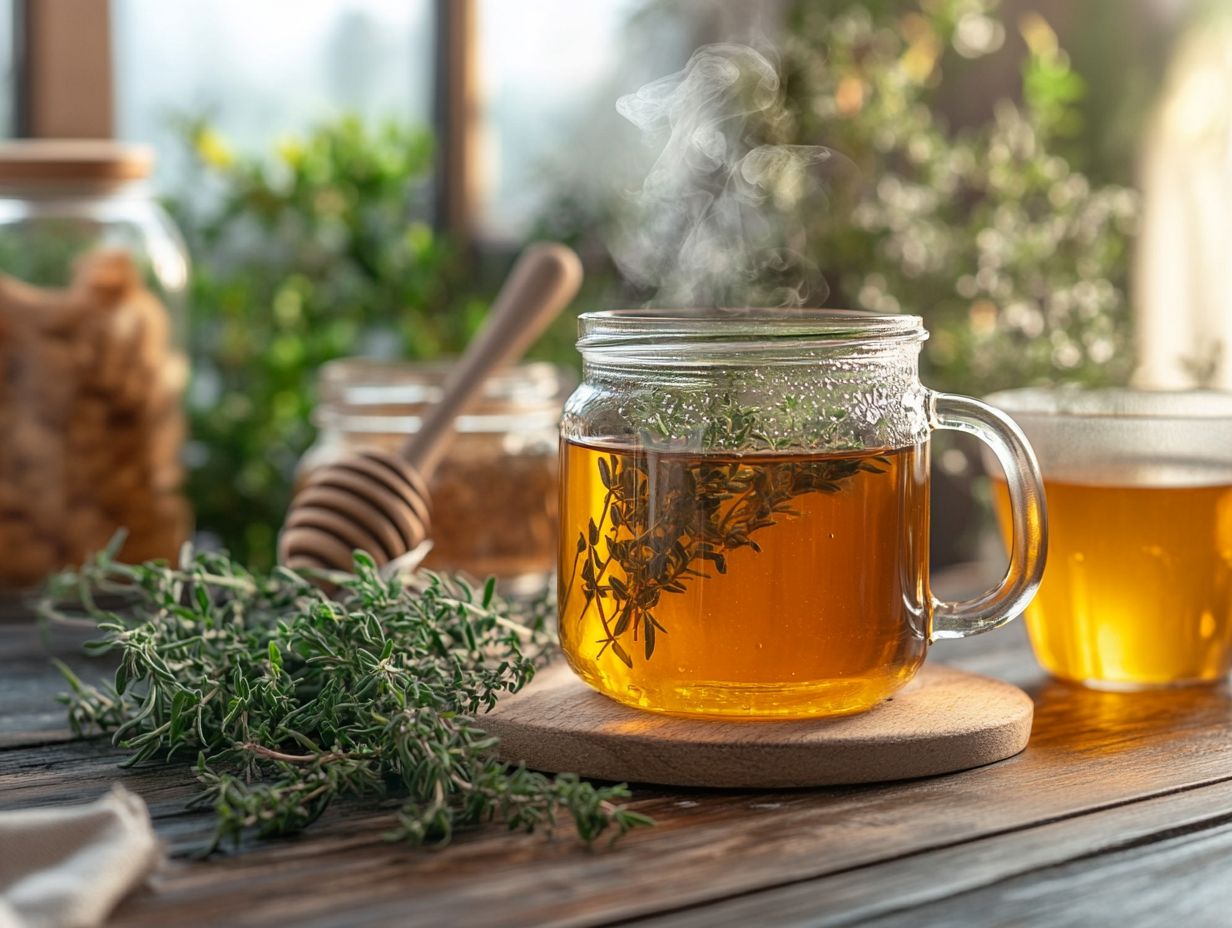
Anti-inflammatory and antiviral properties found in various herbs can significantly reduce flu symptoms and accelerate your recovery. By leveraging these natural remedies, you may experience relief from persistent congestion and the discomfort of a sore throat.
For instance, ingredients like ginger and garlic not only combat inflammation but also boost your immune response. They offer a double layer of defense against viral pathogens.
Elderberry is particularly effective and is known for its ability to shorten the duration of flu symptoms, helping you bounce back more quickly.
When combined in herbal teas or tinctures, including cinnamon and yarrow can create a soothing effect that alleviates discomfort. This promotes better sleep and enhances your overall well-being during illness.
Using Herbs for Prevention and Treatment
Utilizing herbs for both flu prevention and treatment presents a highly effective strategy. By following recommended dosages and methods, you can maximize benefits while minimizing any potential side effects.
Recommended Dosages and Methods
Understanding the recommended dosages and methods for using herbs like echinacea, elderberry, garlic, and thyme can significantly enhance their effectiveness in treating flu and cold.
For example, you might typically take echinacea in capsule form, with a common dosage of 300 mg three times daily.
Elderberry syrup can be administered at one tablespoon for adults and one teaspoon for children, ideally every few hours at the onset of symptoms.
Garlic, celebrated for its antiviral properties, can be consumed raw; one to two cloves are effective when chopped and added to meals or brewed as tea.
These natural remedies also provide strong support in alleviating flu symptoms. They help fortify your immune system, offering a holistic approach to health during flu season.
Possible Side Effects and Interactions
While herbs can provide a wealth of benefits for flu treatment, it is crucial to remain aware of potential side effects and interactions to ensure safe use.
When to Avoid or Use Caution with Herbs
Certain situations require you to tread carefully when considering herbs for flu treatment, especially when side effects or interactions with medications come into play.
If you’re already managing chronic health conditions like diabetes or hypertension, it’s crucial to approach herbal remedies with caution.
While many herbs can offer benefits, they might also affect your blood sugar levels or interact with medications such as blood thinners or antihypertensives.
If you’re pregnant or nursing, you need to be particularly vigilant. Some natural treatments may pose risks to both you and your child.
It’s wise for anyone contemplating herbal flu remedies to consult healthcare professionals to ensure their choices prioritize safety while considering options like 5 herbal teas to soothe your cold symptoms for effective recovery.
Frequently Asked Questions
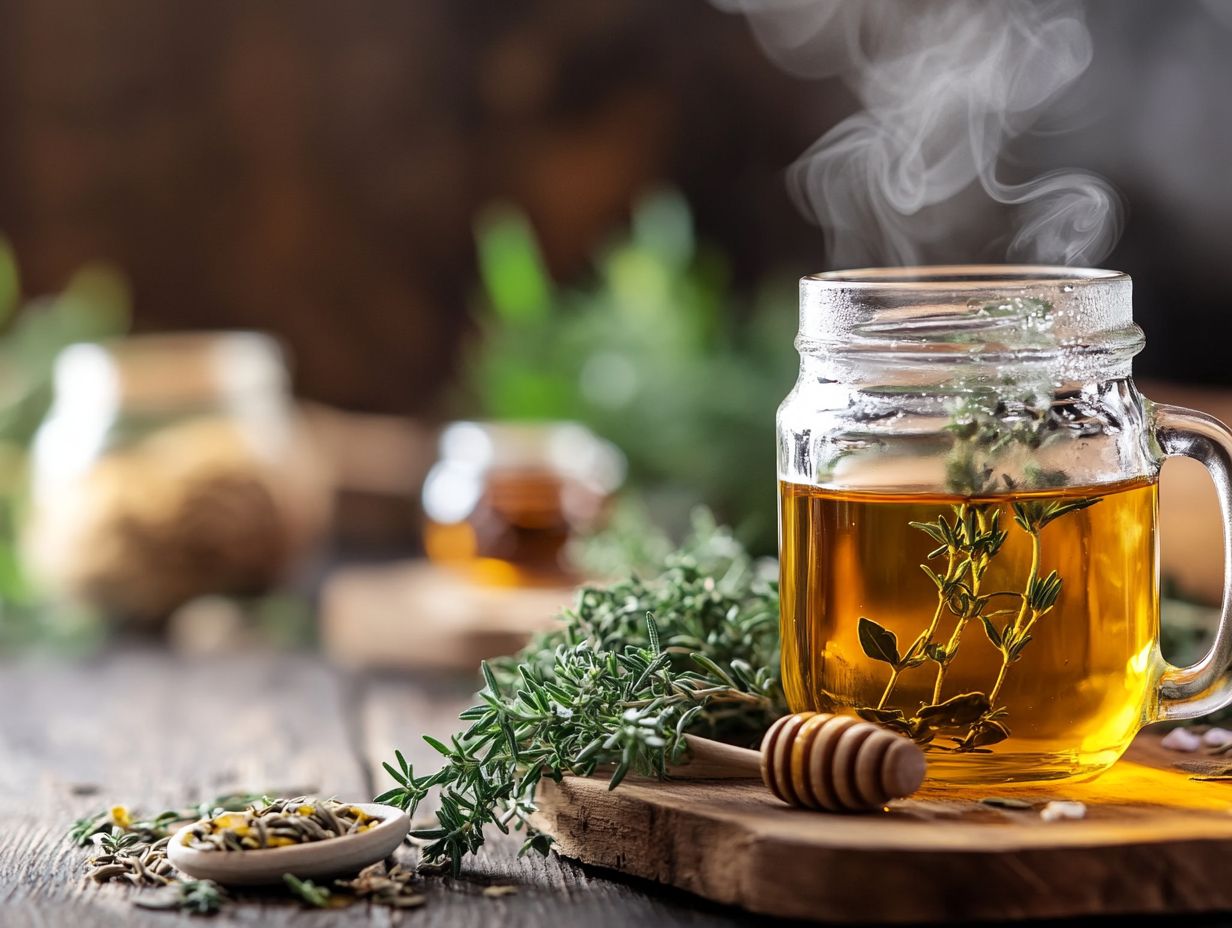
What are some herbs that can help with seasonal flu?
Some herbs that have been traditionally used to help with seasonal flu include echinacea, elderberry, and ginger.
How does echinacea help with seasonal flu?
Echinacea has been shown to stimulate the immune system and may help reduce the severity and duration of flu symptoms.
Can elderberry really help with seasonal flu?
There is some evidence that elderberry may have antiviral properties and could potentially help with flu symptoms. However, more research is needed to confirm its effectiveness.
What is the best way to use ginger for seasonal flu?
Ginger can be consumed in various forms, such as tea, capsules, or fresh root. It is known for its anti-inflammatory and immune-boosting properties, which may help with flu symptoms.
Are there any potential side effects of using herbs for seasonal flu?
Like any medication or supplement, herbs can have potential side effects. It is important to consult with a healthcare provider before using herbs, especially if you have any underlying health conditions or are taking other medications.
Don t miss out on the benefits of these herbs! Talk to your doctor before starting any herbal remedies to ensure they re right for you.
Disclaimer: Always consult your healthcare provider before using herbal remedies, especially if you have existing health conditions.
Is it safe to use herbs with flu medication?
Some herbs may work with certain medications. Generally, there are no known issues between herbs and flu medication.
Always check with a healthcare provider before mixing any treatments. Your health is important, and a quick consultation can ensure your safety!

